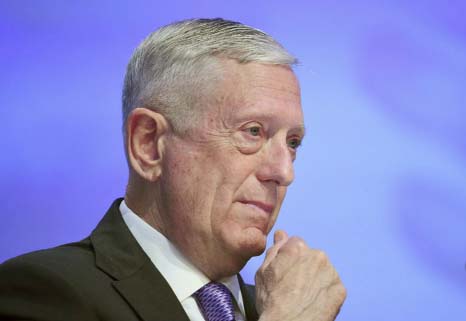
AP, Singapore :
North Korea is accelerating its push to acquire a nuclear-armed missile capable of threatening the United States and other nations, and the U.S. regards this as a “clear and present danger,” U.S. Defense Secretary Jim Mattis said Saturday.
Speaking at an international security conference in Singapore, Mattis said the Trump administration is encouraged by China’s renewed commitment to working with the U.S. and others to rid North Korea of its nuclear weapons. He also said he thinks China, which is North Korea’s closest ally, ultimately will see it as a liability.
China blocked tough new sanctions against North Korea that the United States pushed in the U.N. Security Council on Friday. However, the Security Council did vote unanimously to add 15 individuals and four entities linked to the North’s nuclear and missile programs to a U.N. sanctions blacklist.
In his speech to the Shangri-La Dialogue, sponsored by the International Institute for Strategic Studies, Mattis sought to balance his hopeful comments on China with sharp criticism of what he called Beijing’s disregard for international law by its “indisputable militarization” of artificial islands in disputed areas of the South China Sea.
“We cannot and will not accept unilateral, coercive changes to the status quo” in the South China Sea, he said.
Overall, Mattis’ speech struck a positive, hopeful tone for cooperation and peace in the Asia-Pacific region, where he and his predecessors have made it a priority to nurture and strengthen alliances and partnerships.
“While competition between the U.S. and China, the world’s two largest economies, is bound to occur, conflict is not inevitable,” he said. “Our two countries can and do cooperate for mutual benefit. We will pledge to work closely with China where we share common cause.”
He was, however, unrelentingly critical of North Korea, a politically and economically isolated nation whose leaders have long viewed the United States as a military threat, in part because of periodic U.S. military exercises with South Korea, which the North sees as preparations for attacks aimed at destroying its ruling elite. He called North Korea an “urgent military threat.” In a question-and-answer session with his audience of national security experts from across the globe, Mattis was asked whether the U.S. might attack the North pre-emptively and without warning South Koreans in advance.
“We’re working diplomatically, economically, we’re trying to exhaust all possible alternatives to avert this race for a nuclear weapon in violation of … the United Nations’ restrictions on North Korea’s activities,” he said.
North Korea is accelerating its push to acquire a nuclear-armed missile capable of threatening the United States and other nations, and the U.S. regards this as a “clear and present danger,” U.S. Defense Secretary Jim Mattis said Saturday.
Speaking at an international security conference in Singapore, Mattis said the Trump administration is encouraged by China’s renewed commitment to working with the U.S. and others to rid North Korea of its nuclear weapons. He also said he thinks China, which is North Korea’s closest ally, ultimately will see it as a liability.
China blocked tough new sanctions against North Korea that the United States pushed in the U.N. Security Council on Friday. However, the Security Council did vote unanimously to add 15 individuals and four entities linked to the North’s nuclear and missile programs to a U.N. sanctions blacklist.
In his speech to the Shangri-La Dialogue, sponsored by the International Institute for Strategic Studies, Mattis sought to balance his hopeful comments on China with sharp criticism of what he called Beijing’s disregard for international law by its “indisputable militarization” of artificial islands in disputed areas of the South China Sea.
“We cannot and will not accept unilateral, coercive changes to the status quo” in the South China Sea, he said.
Overall, Mattis’ speech struck a positive, hopeful tone for cooperation and peace in the Asia-Pacific region, where he and his predecessors have made it a priority to nurture and strengthen alliances and partnerships.
“While competition between the U.S. and China, the world’s two largest economies, is bound to occur, conflict is not inevitable,” he said. “Our two countries can and do cooperate for mutual benefit. We will pledge to work closely with China where we share common cause.”
He was, however, unrelentingly critical of North Korea, a politically and economically isolated nation whose leaders have long viewed the United States as a military threat, in part because of periodic U.S. military exercises with South Korea, which the North sees as preparations for attacks aimed at destroying its ruling elite. He called North Korea an “urgent military threat.” In a question-and-answer session with his audience of national security experts from across the globe, Mattis was asked whether the U.S. might attack the North pre-emptively and without warning South Koreans in advance.
“We’re working diplomatically, economically, we’re trying to exhaust all possible alternatives to avert this race for a nuclear weapon in violation of … the United Nations’ restrictions on North Korea’s activities,” he said.

